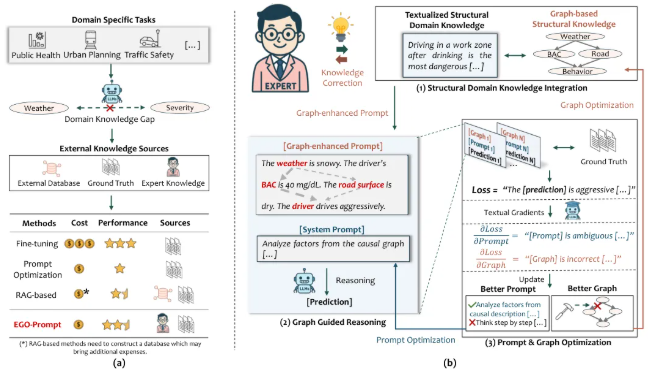Recently, Johns Hopkins University introduced a framework called EGO-Prompt, which significantly improves the performance of small language models in specialized tasks, with a performance improvement of nearly 50% and a cost reduction of 83%. This innovative framework is mainly used for specialized tasks such as medical diagnosis and traffic management, allowing small AI models to rival large reasoning models.
In practical applications, designing appropriate prompts is a challenge. It not only requires integrating professional domain knowledge but also ensuring that AI can effectively reason and extract key information. The core of the EGO-Prompt framework is its ability to automatically generate optimized prompts and combine causal logic to help AI think step by step like humans.

The framework starts with simple prompts and causal relationship diagrams provided by experts. Through automatic optimization, it generates specific reasoning guidelines, making the AI's thinking clearer. This process repeatedly adjusts the causal diagram and prompt through real data until the best results are achieved. In addition, EGO-Prompt can enhance the model's interpretability, making it easier for users to understand the basis of AI's judgments.
Compared to previous best methods, EGO-Prompt improved the F1 score by an average of 7.32% to 12.61%. Small AI models using this framework can achieve the performance of large AI models at a cost as low as 20% of the original. This dynamic knowledge evolution approach makes expert knowledge no longer static, but instead grows together with the model.
The innovation of EGO-Prompt lies in transforming expert knowledge from a static graph into a semantic causal graph (Semantic Causal Graph, SCG), and allowing the initial graph to have some imperfections. This fault-tolerant design makes the optimization process more flexible, thus avoiding potential semantic drift during the generation process.
EGO-Prompt uses a sophisticated two-stage reasoning mechanism, breaking down the reasoning process into two steps: guidance generation and conditional reasoning, greatly reducing the cognitive load on the model and making it more efficient when handling complex specialized data.
github: https://github.com/miemieyanga/EGO-Prompt
Key Points:
- 🚀 The EGO-Prompt framework increases the performance of small AI models by nearly 50% and reduces costs by 83%.
- 📊 The new method improves AI reasoning capabilities by automatically optimizing prompts and causal logic.
- 🧠 It uses a semantic causal graph, allowing the initial knowledge graph to have imperfections, promoting dynamic knowledge evolution.
